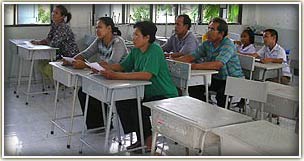Say What? Thai people respect those with 'Jai Yen' - a patient heart or a cool head, and keeping these in mind could make your holiday. Find out why... Going to Thailand? How important is it to know some Thai language? Well, on our holidays - we take you off the beaten track, away from other tourists to see the another side of life in Thailand, stay near to communities and really get to know the country when you are taken out by locals. So should they have to speak your language? Well no, but while you may be lucky and meet Thais that can converse with you - it's not the end of the world if they can't because communication isn't always word-focused. Just Smile It's not so hard to speak without words, we do it all the time. Thailand is the 'land of smiles' and that might be your first communication with your Host. You'd be surprised how many barriers a grin can break down. It reassures your Host that you're pleased to be there, you like their home and so much more. Smiling is a universal language wherever you are. Sign Language This may be the way you communicate but you'll be surprised how easy sign language can be in making yourself heard. It's a fun challenge and something to be proud every time you succeed. If they don't speak English, your Hosts will let their hands do the talking to check if you need anything, arrange dinner or just to exchange pleasantries. Everyone in your group can be introduced by all of you motioning, one by one (for example, everyone bringing their hand to their chest) and saying their name. "You'd be surprised how many barriers a grin can break down" Just try not to get frustrated or lose your temper if you are having trouble making yourself understood. Keep calm and rethink: Is there a better way I can do this? Good tips if you're trying to make yourself understood in English are to prounce words slower and really articulate them, and try to use different phrases to explain as easily as possible what you want to say. Thai Speak Here's a few common words/phrases to help you out. No-one's saying the Thai language is an easy one for novices but people will respect you for trying. They may even try to guide you and help by correcting your prounciation. It is common, like in other languages for there to be different masculine and feminine versions of some words so look out for the (f) next to what women should say and (m) for the male equivalent. Hello = Sawat dii khrap (m) / Sawat dii kha (f) Thank you = Khawp khun khrap (m) / Khawp khun kha (f) It doesn't matter/no worries = Mai ben rai Good luck = Chock dee Very delicious = Aroy maak OR Tasty = Aroy The best compliment you can offer for any cooked food. Foreigner = farang Temple = wat Island = ko/koh You might get asked: "Bai nai?" - "What are you doing?" which is often used instead of "How are you?". A good response is: "Bai tee-o" which means "I'm going out socially". When you meet someone, it is also common to use traditional greeting, the wai. This is the Thai equivalent of a handshake and used to show thanks or respect. If a person does a wai for you, you should generally wai back. It's a prayer-like gesture where the hands are placed - palms together close to the chest, fingertips just under the chin and you nod to acknowledge the other person. Ready to put these tips into practice? Click here to check out some of our journeys.
|
Telephone us
We're here till 9pm Monday to Sunday 0800 011 2571 or 020 7060 4571   
|







